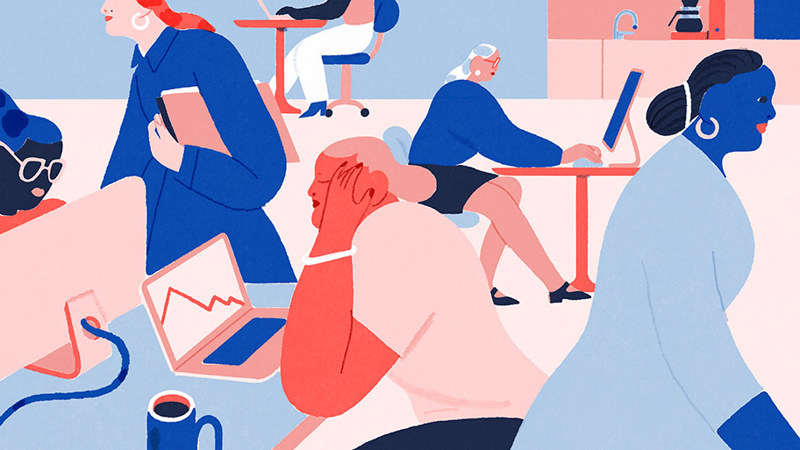Menopause is a pricey taboo in the workplace
Are menopause the new glass ceiling? If careers are to be extended and full potential unlocked, the impact of menopausal symptoms on work ability and well-being must be taken seriously. Turning a blind eye is discriminatory and comes at a price.

The University of Eastern Finland is an international workplace with more than 3 000 professionals. The work community is immersed in diversity from perspectives such as ethnicity, gender and sexual identity and neurodiversity.
This autumn, these were joined by a new issue: menopause.
– We are part of a European network of universities, through which we have learned about the alarming results on this topic," says Anne Kauppinen, a human resources expert at the university.
A survey in the UK found that one in five women aged 40-60 were considering redundancy because of menopause and lack of support. British colleagues reported findings that lecturers and workshop leaders, for example, no longer wanted to present or lead teaching groups because of menopausal symptoms.
The University of Eastern Finland thought that this was a subject that needed to be discussed.
– If there are symptoms and they interfere with your ability to work, you have to react in some way. We have also recognised that menopause is taboo, a bit like mental health issues used to be," says Kauppinen.
Terveystalo conducted a survey of menopausal women in the summer of 2024, which shows the same phenomenon: 30% of respondents had felt that menopausal symptoms had affected their ability to work and more than 20% had felt that menopausal symptoms had affected their career choices. Among other things, women had felt more tired or stressed at work than before.
– Being tired all the time makes it challenging to work when you have to keep pushing yourself to get through the day. You don't feel like doing anything after work," describes one respondent.
Sleep disturbance and fatigue were the most common menopausal symptoms perceived as difficult. These are also symptoms that have a sensitive effect on a person's ability to concentrate and function.
The increase in sleep symptoms does not surprise Kaisu Norbäck, senior occupational health physician at Terveystalo.
– In today's working life, good cognitive capacity is required in almost all job descriptions. And we all know what insomnia or a few nights of poor sleep does to a person: it's the equivalent of being drunk. And that's where the demanding specialist work should come in.
In the context of the menopause, we have traditionally talked mainly about hot waves and the need for air conditioning, for example. The survey results raise the question: is the real impact of menopause on working life really understood? And what is the human cost or impact on companies and workplaces?
Up to one in five workers
There is still relatively little research on the impact of the change over years on work ability, well-being and performance at work. What is known, however, is that up to 40-60% of women experience sleep problems during menopause. According to a study by the University of Oulu, early onset of menopause is associated with sick leave and poorer work performance.
According to a recent review of research published in the journal Lääkärilehti, menopause is associated with higher than usual levels of mood swings, depression, concentration problems, memory problems and brain fog. Among other things, a survey by Terveystalo shows that menopausal symptoms are far from always recognised. Many women go without treatment.
This is by no means a trivial matter. According to Statistics Finland, more than 20% of employed people are women aged over 45. This means that well over half a million working women in Finland, with 15-25 years of working life ahead of them, are affected by the menopause.
– Extending working lives is an important societal goal and a core task for occupational health actors such as Terveystalo," says Norbäck.
If, for example, one in five people do not apply for a more demanding or otherwise new job because of menopause, as the Terveystalo survey shows, the result is alarming.
– Is menopause the new glass ceiling for women? Norbäck asks.
The underlying cause of work fatigue may be sleep disturbances and mood swings associated with menopausal symptoms.
Terveystalo employs 4 500 menopausal women, a third of all Terveystalo employees. Human Resources Director Minttu Sinisalo says it is a problem from the employer's point of view if they have to cope with difficult symptoms.
She has no doubt that menopausal women are doing a good job. They do, even if it is at the expense of the rest of their lives.
– They are in the prime of their working lives: skilled, wise, accomplished and great front-line workers. But it's unfair if women have to put up with the symptoms," says Sinisalo.
One wonders what these women would be capable of if their potential were fully realised.
– The key issue for Finland is how to keep the working-age population in work for longer. We need to harness all the resources we have," says Ville Iho, CEO of Terveystalo.
All this comes at a price. Minttu Sinisalo is quick to calculate that a drop of even a few percent in work performance and capacity can quickly cost a labour-intensive company millions of euros if it affects a significant part of the workforce.
Policy makers are also waking up to the issue. The current government programme for 2023 includes a commitment to promote the identification and good management of menopausal symptoms in occupational health care to strengthen well-being and reduce misdiagnosis and sickness absence. As part of this work, the National Institute of Occupational Health is currently carrying out a study commissioned by the Ministry of Social Affairs and Health on current practices in occupational health care.
If the symptoms of menopause are not recognised, women may be sent unnecessarily for expensive sleep tests, for example. In contrast, proper treatment of symptoms due to estrogen deficiency is straightforward and effective.
Sinisalo and Iho stress that investing in women's well-being pays off.
– Inadequate menopause care is not just a problem for individual women, but a fantastic opportunity to improve the health and working capacity of people in their prime working years - and thereby also support companies and the economy as a whole," says Ville Iho.
As part of anticipating work-cycle risks "I feel that I don't know enough about it. I feel it's difficult to get information and there could be more support in occupational health." (Respondent to the Terveystalo survey)
What can employers, for example, do? Awareness raising is a good start. For example, surveys in the UK found that women going through menopause needed better awareness of menopause from employers and front-line workers.
Employers should consider menopause as part of their capability management, says Mervi Viljamaa, a specialist in capability management at Elo.
– This can be done by talking openly about the issue, by sharing information, by taking the age group into account in the company's HR policy and by enabling the treatment of menopausal symptoms also in occupational health care," says Viljamaa.
Forty-three per cent of respondents to Terveystalo's survey also felt that their employer could or could have supported them during the menopause by offering treatment for menopausal symptoms as part of occupational health.
39% of respondents did not know that menopause care could be part of occupational health.
And, of course, it is not always covered by occupational health contracts.
According to Kaisu Norbäck, senior occupational health physician at Terveystalo, this is discriminatory.
In the name of equality, the investigation and treatment of gynaecological problems that threaten women's ability to work are just as much a part of occupational health as other issues that affect their ability to work and well-being. And urology is not excluded either.
– Given how difficult symptoms can be and how effectively many other symptoms and illnesses affecting working capacity are treated and prevented, menopausal symptoms are not taken with the same seriousness," says Norbäck.
– If left untreated, insomnia and low mood can lead to depression, which in turn can lead to permanent disability. Menopausal symptoms are definitely something that we need to include in the prevention and anticipation of work-related risks.
There is still room in the front ranks
Menopausal symptoms should be seen as a factor affecting work ability and well-being among others, says Elon's Mervi Viljamaa.
– I don't recall seeing menopause in career or ageing programmes, but they could well include guidance on how to support the work capacity of menopause sufferers as part of other measures to support ageing.
According to Kaisu Norbäck, identifying and treating menopause symptoms should be basic knowledge for all those working in occupational health. This is why Terveystalo has organised 15 training sessions on menopause this year for its own medical staff and other professionals, from occupational health nurses to psychologists, physiotherapists and sleep coaches.
According to Minttu Sinisalo, Human Resources Director at Terveystalo, it is important to break down taboos and myths about menopause.
There is a lot of talk about age discrimination and whether companies recruit women over 50. An equally big question is whether employers support the well-being of women of that age.
– We need to be able to talk about menopause in the same way as we talk about other issues that affect our ability to work. We have lectures on ergonomics and brain health," says Sinisalo.
The University of Eastern Finland is already firmly on this path, as a pioneer.
As a first step, the university is organising a webinar for its staff on the subject, to which Kaisu Norbäck has been invited to speak. It is part of a series of three webinars on Diversity in Working Life.
– We don't have ready-made solutions yet, we are still in the awareness-raising p
hase," says HR expert Anne Kauppinen.European colleagues have already adopted a "body at work" approach. It means that body and mind are closely linked. Everyone comes to work as a whole person, and a lot can happen in each body or life depending on the stage of life. Menopause is one such stage, not an embarrassing or shameful exception.
Read more occupational health articles

Our bodies are telling us we're overloaded - here's how to spot your own warning signs
Stressed about returning to work and the hustle and bustle of everyday life? Our bodies often give us clear warning signs of overload. Listening to yourself is an important preventative measure.

Healthy Working Life Barometer 2025: How to ensure that Finnish working life remains competitive and healthy in the future?
Terveystalo's annual Healthy Working Life Barometer surveyed the state of Finnish working life and the ability of organisations to respond to the changing world of work.

Increasing use of AI in healthcare - Terveystalo has published its ethical principles for AI
AI offers significant potential for solving healthcare problems, but its use requires accountability and clear principles from healthcare organisations.

Collaboration is the only way to solve wicked problems
Disability due to mental health challenges is a complex and nebulous problem that cannot be solved by individual tricks. It requires a long-term and systematic approach at both individual and community level. According to Simo Taimela, senior epidemiologist at Terveystalo, tackling the mental health epidemic requires both preventive measures for work communities and targeted and effective treatment for those who will benefit most.

Mental health-related sickness absences finally started to decrease - Terveystalo commits to an ambitious target for 2025
In Finland, it is estimated that up to 7 million working days are lost each year due to mental health-related sick leave. Not only can mental health challenges, if chronic, lead to unnecessary premature exclusion from working life, but the situation is also unsustainable for Finland's vitality and national economy. Recent data from Terveystalo show that timely and appropriate interventions have reduced the duration of mental health-related absenteeism and brought it down for the first time in a decade. This significant turnaround gives hope that the mental health crisis can be prevented, but it will require a concerted effort by all concerned.

How to prevent overheating in working life - A recent survey shows that 80% of Finns feel the pace of working life has accelerated
According to a survey* commissioned by Terveystalo, up to four out of five Finns feel that the pace of working life has become faster and more stressful. Only 13% of respondents feel that working life is developing in a positive direction. This acceleration of the pace of work is reflected in a growing number of mental health problems among working-age people, which affects their ability to work and the productivity and growth prospects of companies. Terveystalo's organisational psychologists Jaakko Sahimaa and Annamari Heikkilä call for a sustainable pace of work as a solution to the overheating of working life.